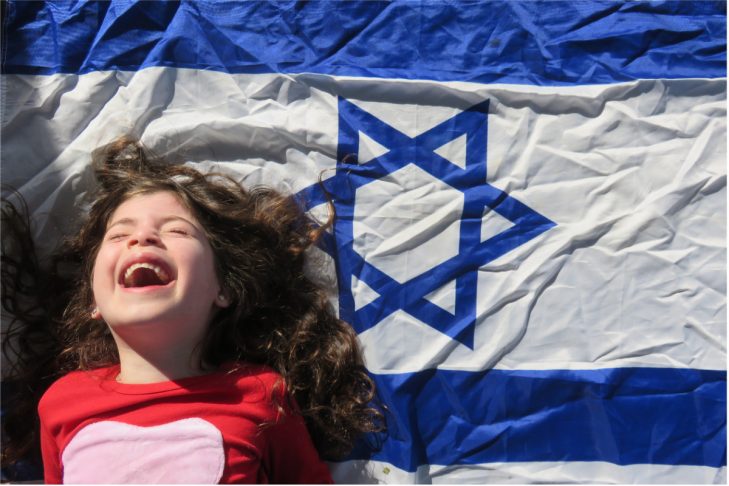“Love, first, details later”—that’s how social scientist Sivan Zakai describes the traditional approach taken to teaching young children about Israel.
And in her provocative new book, “My Second-Favorite Country: How American Jewish Children Think About Israel,” she argues it risks doing more harm than good.
As she sees it, this approach shortchanges kids of a more nuanced and meaningful understanding of the country and its importance to Jews and Judaism.
Her advice: Listen to the children. Zakai believes parents should guide their children’s curiosity about Israel and its controversies, not shield them from the realities of the Middle East conflict.
Zakai, director of the Children’s Learning About Israel Project at Brandeis University’s Jack, Joseph and Morton Mandel Center for Studies in Jewish Education, which partially funded her research, followed 35 Jewish children in kindergarten through sixth grade in Los Angeles.
She interviewed them regularly about their views on Israel and the Middle East and their Jewish identity.
- The kids, half female and half male, ranged from Reform to Orthodox.
- They all attended Jewish day schools in kindergarten, though, by grade six, about half had switched to non-Jewish public and private schools or were being homeschooled.
She found that as early as second or third grade, the children understood that the situation in Israel was more complex than many adults in their lives were letting on. Yet because they had access to the internet and other media, they could easily find out more about Israel on their own.
Zakai, who is also an associate professor at Hebrew Union College, spoke about her book and her vision for a new approach to educating children about Israel.
What is the single greatest misconception about how to teach young kids about Israel?
I think the greatest misperception is an idea often characterized as “Love, first, details later”—that to induct children into a collective Jewish experience, they first need to be taught to love Israel and shouldn’t be taught anything contentious, political or dangerous.
Isn’t it a problem to subject kids to the violence of the Israeli-Palestinian conflict?
As a parent, I fully understand the urge to protect children. We have to protect their bodies. We have to protect their psyches. But research confirms that talking to kids about difficult current events—things that are happening in the world that are confusing or troubling or disturbing—doesn’t traumatize them. It makes them more equipped to deal with a world in which that is happening. Our gut reaction is to wrap our children in bubble wrap so they never encounter any harm, but it does more harm than good.
More harm than good?
I worry about the mental health of children. It’s a very difficult time to be a child growing up in a world that is unsafe and unstable in all sorts of ways. And they know it because they have access to all sorts of digital information. Children need adults they can rely on and adults they can trust. Adults need to learn to talk to them about the things they care about, the things they wonder about and the things they worry about.
You found kids are learning about Israel on their own.
For example, a third-grader told me about going out to dinner with his family. There was a television screen in the corner of the restaurant, and some news program was on. At the bottom of the screen, the ticker started scrolling about war in Israel. He asked his parents, “What’s going on?” and they said, “Oh, don’t worry about it. Everything’s fine.” And he thought, “Well, clearly not. I just saw things exploding on the screen.” So, he went home and did a Google search for rockets in Israel and started watching all sorts of videos showing the conflict.
What concerns did Jewish educators have about teaching about Israel?
One teacher said, “My worst fear is that they might walk away from my classroom without feeling a commitment to the project of Israel in the way that I feel. And my other worst fear is that they will walk away and go into college and learn all sorts of things that I didn’t tell them and think, ‘My teacher lied to me.’”
How did you respond to that?
I think I can alleviate some of these fears because the kids in this study believed that part of their obligation as Jews was to work toward creating a better society. And they extended that belief to Israel. One of the most articulate kids in the study, a kindergartener, told me, “I really want to go to Israel to help pick up trash on the streets.” She felt personally obligated to get on an airplane, travel halfway around the world and do her part to help make a better Israel. The kids are developing a deep commitment to a certain kind of Jewish worldview. And that gave them a sense of connection to Israel.
What’s your message to Jewish parents?
Listen to your children. Talk to your children. Children are amazing. They can teach us so much. They are the experts in their thinking, feelings and way of being in the world. And we, as parents and the adults in their lives, can listen to that and honor it. And learn from it. Only by doing that can we help them understand the world and contextualize it for them. The best way to build resilience, a sense of self and purpose and connection to a greater Jewish community and the wider world is by engaging children in conversations about the real world—in all its beauty and messiness.
This article originally appeared on The Jewish Experience, Brandeis University’s website devoted to Jewish issues. Subscribe to the monthly newsletter.
This post has been contributed by a third party. The opinions, facts and any media content are presented solely by the author, and JewishBoston assumes no responsibility for them. Want to add your voice to the conversation? Publish your own post here. MORE


